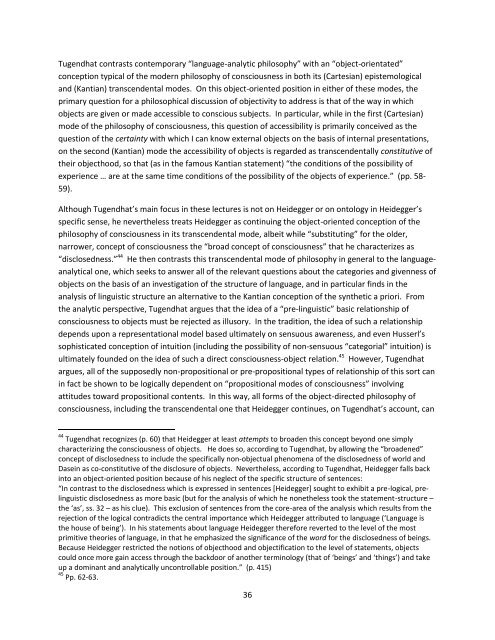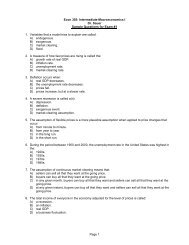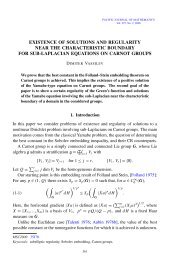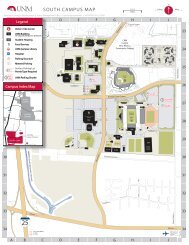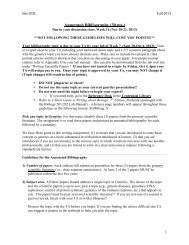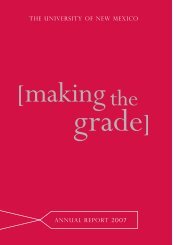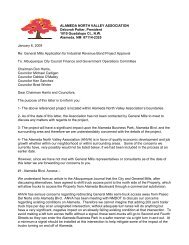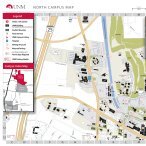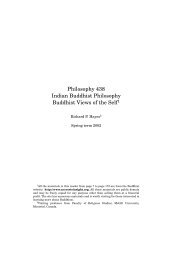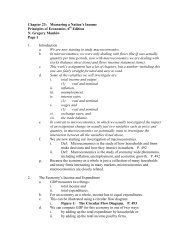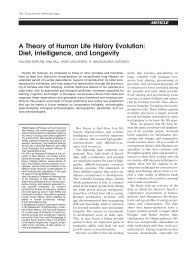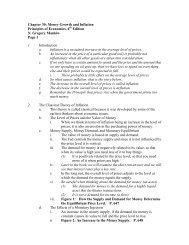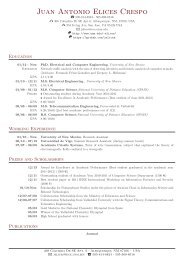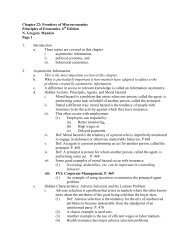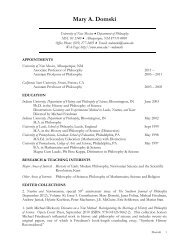Heidegger, Tugendhat, Davidson - University of New Mexico
Heidegger, Tugendhat, Davidson - University of New Mexico
Heidegger, Tugendhat, Davidson - University of New Mexico
Create successful ePaper yourself
Turn your PDF publications into a flip-book with our unique Google optimized e-Paper software.
<strong>Tugendhat</strong> contrasts contemporary “language-analytic philosophy” with an “object-orientated”<br />
conception typical <strong>of</strong> the modern philosophy <strong>of</strong> consciousness in both its (Cartesian) epistemological<br />
and (Kantian) transcendental modes. On this object-oriented position in either <strong>of</strong> these modes, the<br />
primary question for a philosophical discussion <strong>of</strong> objectivity to address is that <strong>of</strong> the way in which<br />
objects are given or made accessible to conscious subjects. In particular, while in the first (Cartesian)<br />
mode <strong>of</strong> the philosophy <strong>of</strong> consciousness, this question <strong>of</strong> accessibility is primarily conceived as the<br />
question <strong>of</strong> the certainty with which I can know external objects on the basis <strong>of</strong> internal presentations,<br />
on the second (Kantian) mode the accessibility <strong>of</strong> objects is regarded as transcendentally constitutive <strong>of</strong><br />
their objecthood, so that (as in the famous Kantian statement) “the conditions <strong>of</strong> the possibility <strong>of</strong><br />
experience … are at the same time conditions <strong>of</strong> the possibility <strong>of</strong> the objects <strong>of</strong> experience.” (pp. 58-<br />
59).<br />
Although <strong>Tugendhat</strong>’s main focus in these lectures is not on <strong>Heidegger</strong> or on ontology in <strong>Heidegger</strong>’s<br />
specific sense, he nevertheless treats <strong>Heidegger</strong> as continuing the object-oriented conception <strong>of</strong> the<br />
philosophy <strong>of</strong> consciousness in its transcendental mode, albeit while “substituting” for the older,<br />
narrower, concept <strong>of</strong> consciousness the “broad concept <strong>of</strong> consciousness” that he characterizes as<br />
“disclosedness.” 44 He then contrasts this transcendental mode <strong>of</strong> philosophy in general to the languageanalytical<br />
one, which seeks to answer all <strong>of</strong> the relevant questions about the categories and givenness <strong>of</strong><br />
objects on the basis <strong>of</strong> an investigation <strong>of</strong> the structure <strong>of</strong> language, and in particular finds in the<br />
analysis <strong>of</strong> linguistic structure an alternative to the Kantian conception <strong>of</strong> the synthetic a priori. From<br />
the analytic perspective, <strong>Tugendhat</strong> argues that the idea <strong>of</strong> a “pre-linguistic” basic relationship <strong>of</strong><br />
consciousness to objects must be rejected as illusory. In the tradition, the idea <strong>of</strong> such a relationship<br />
depends upon a representational model based ultimately on sensuous awareness, and even Husserl’s<br />
sophisticated conception <strong>of</strong> intuition (including the possibility <strong>of</strong> non-sensuous “categorial” intuition) is<br />
ultimately founded on the idea <strong>of</strong> such a direct consciousness-object relation. 45 However, <strong>Tugendhat</strong><br />
argues, all <strong>of</strong> the supposedly non-propositional or pre-propositional types <strong>of</strong> relationship <strong>of</strong> this sort can<br />
in fact be shown to be logically dependent on “propositional modes <strong>of</strong> consciousness” involving<br />
attitudes toward propositional contents. In this way, all forms <strong>of</strong> the object-directed philosophy <strong>of</strong><br />
consciousness, including the transcendental one that <strong>Heidegger</strong> continues, on <strong>Tugendhat</strong>’s account, can<br />
44 <strong>Tugendhat</strong> recognizes (p. 60) that <strong>Heidegger</strong> at least attempts to broaden this concept beyond one simply<br />
characterizing the consciousness <strong>of</strong> objects. He does so, according to <strong>Tugendhat</strong>, by allowing the “broadened”<br />
concept <strong>of</strong> disclosedness to include the specifically non-objectual phenomena <strong>of</strong> the disclosedness <strong>of</strong> world and<br />
Dasein as co-constitutive <strong>of</strong> the disclosure <strong>of</strong> objects. Nevertheless, according to <strong>Tugendhat</strong>, <strong>Heidegger</strong> falls back<br />
into an object-oriented position because <strong>of</strong> his neglect <strong>of</strong> the specific structure <strong>of</strong> sentences:<br />
“In contrast to the disclosedness which is expressed in sentences [<strong>Heidegger</strong>] sought to exhibit a pre-logical, prelinguistic<br />
disclosedness as more basic (but for the analysis <strong>of</strong> which he nonetheless took the statement-structure –<br />
the ‘as’, ss. 32 – as his clue). This exclusion <strong>of</strong> sentences from the core-area <strong>of</strong> the analysis which results from the<br />
rejection <strong>of</strong> the logical contradicts the central importance which <strong>Heidegger</strong> attributed to language (‘Language is<br />
the house <strong>of</strong> being’). In his statements about language <strong>Heidegger</strong> therefore reverted to the level <strong>of</strong> the most<br />
primitive theories <strong>of</strong> language, in that he emphasized the significance <strong>of</strong> the word for the disclosedness <strong>of</strong> beings.<br />
Because <strong>Heidegger</strong> restricted the notions <strong>of</strong> objecthood and objectification to the level <strong>of</strong> statements, objects<br />
could once more gain access through the backdoor <strong>of</strong> another terminology (that <strong>of</strong> ‘beings’ and ‘things’) and take<br />
up a dominant and analytically uncontrollable position.” (p. 415)<br />
45 Pp. 62-63.<br />
36


